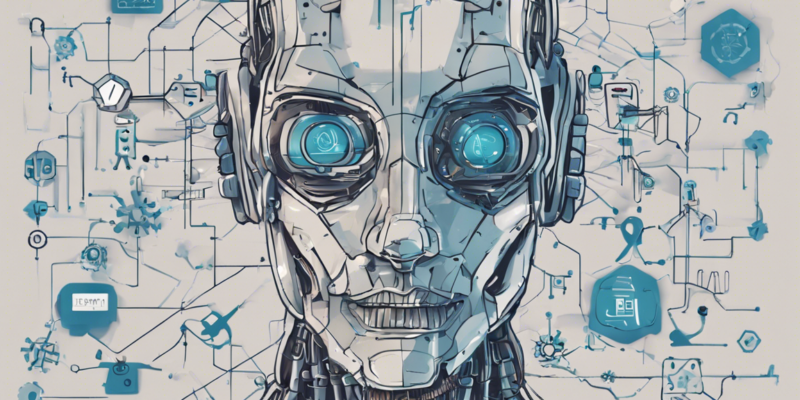In recent years, the integration of Artificial Intelligence (AI) into various industries has brought about numerous benefits in terms of efficiency, cost reduction, and enhanced decision-making processes. One particular area where AI is rapidly gaining traction is in DevOps teams. DevOps, a portmanteau of Development and Operations, is a software development methodology that combines software development with IT operations, aiming to shorten the systems development life cycle and provide continuous delivery of high-quality software.
AI technologies have the potential to revolutionize the way DevOps teams operate, offering a wide range of capabilities to streamline processes, improve productivity, and optimize performance. In this article, we will explore the various ways in which AI can be effectively utilized in DevOps teams to drive innovation and success.
Understanding Artificial Intelligence in DevOps
Before delving into the specific use cases of AI in DevOps, it’s essential to understand what AI is and how it can be applied in this context. Artificial Intelligence refers to the simulation of human intelligence processes by machines, particularly computer systems. AI technologies such as machine learning, natural language processing, neural networks, and deep learning enable machines to learn from data, recognize patterns, and make decisions with minimal human intervention.
In the realm of DevOps, AI can be leveraged to automate tasks, optimize workflows, enhance collaboration, and facilitate predictive analytics. By harnessing the power of AI, DevOps teams can overcome various challenges associated with complex software development processes and achieve greater efficiency and agility.
The Benefits of AI in DevOps Teams
1. Automation: One of the primary benefits of integrating AI into DevOps is automation. AI-powered tools can automate repetitive tasks, such as code testing, deployment, and monitoring, allowing teams to focus on more strategic and creative endeavors.
2. Efficiency: AI algorithms can analyze vast amounts of data quickly and accurately, enabling DevOps teams to identify patterns, anomalies, and performance issues in real-time. This proactive approach to monitoring and troubleshooting enhances overall efficiency and prevents potential downtime.
3. Predictive Analytics: AI can predict potential issues before they occur by analyzing historical data and identifying trends. By leveraging predictive analytics, DevOps teams can preemptively address issues, optimize resource allocation, and improve system reliability.
4. Continuous Integration and Continuous Deployment (CI/CD): AI tools can streamline the CI/CD pipeline by automating testing, deployment, and feedback processes. This accelerates software delivery cycles, improves code quality, and ensures seamless integration across development and operations teams.
5. Decision Support: AI systems can provide valuable insights and recommendations to DevOps teams, aiding in decision-making processes related to resource allocation, performance optimization, and risk assessment.
Use Cases of AI in DevOps
1. Automated Testing: AI-powered testing tools can analyze code, identify bugs, and run test cases autonomously. This accelerates the testing process, improves test coverage, and enhances software quality.
2. Anomaly Detection: AI algorithms can detect anomalies in system performance, security breaches, and infrastructure issues in real-time. This proactive approach to monitoring helps prevent potential disruptions and ensures system reliability.
3. Capacity Planning: AI can analyze historical data, user behavior, and performance metrics to optimize resource allocation and capacity planning. By predicting future demand and identifying potential bottlenecks, DevOps teams can ensure optimal system performance.
4. ChatOps: AI-powered chatbots can facilitate communication and collaboration within DevOps teams, providing instant responses to queries, automating routine tasks, and enhancing overall productivity.
5. Security: AI technologies can enhance security measures by detecting vulnerabilities, identifying threats, and implementing proactive security protocols. By leveraging AI for security purposes, DevOps teams can mitigate risks and protect sensitive data.
Implementing AI in DevOps Teams
1. Evaluate Your Needs: Identify areas within your DevOps processes that could benefit from AI integration. Prioritize tasks that are repetitive, time-consuming, or require advanced analytics.
2. Choose the Right AI Tools: Research and select AI tools that align with your team’s requirements and objectives. Consider factors such as scalability, compatibility, ease of integration, and vendor reputation.
3. Data Management: Ensure that your data is clean, structured, and readily accessible for AI algorithms to analyze. Data quality is crucial for the success of AI initiatives in DevOps.
4. Training and Skills Development: Provide training and resources to enhance your team’s AI literacy and technical skills. Encourage continuous learning and experimentation with AI technologies.
5. Collaboration and Communication: Foster a culture of collaboration and open communication within your DevOps team to facilitate the smooth integration of AI tools and workflows. Encourage knowledge sharing and cross-functional collaboration.
Frequently Asked Questions (FAQs)
1. What is the role of AI in DevOps?
- AI plays a crucial role in automating tasks, enhancing efficiency, enabling predictive analytics, streamlining CI/CD processes, and providing decision support in DevOps teams.
2. How can AI improve software testing in DevOps?
- AI-powered testing tools can automate test case generation, identify bugs in code, improve test coverage, and accelerate the testing process in DevOps environments.
3. What are some popular AI tools used in DevOps?
- Popular AI tools for DevOps include TensorFlow, Apache Mahout, IBM Watson, Microsoft Azure Machine Learning, and H2O.ai.
4. How does AI enhance security in DevOps?
- AI technologies can detect security vulnerabilities, identify threats, analyze security logs, and implement proactive security measures to protect DevOps environments from cyber threats.
5. What are the key challenges of implementing AI in DevOps?
- Key challenges include data quality issues, skill gaps within teams, scalability concerns, integration complexities, and cultural resistance to change.
6. How can AI facilitate collaboration in DevOps teams?
- AI-powered chatbots and collaboration tools can streamline communication, automate routine tasks, provide instant responses to queries, and enhance overall productivity and teamwork within DevOps teams.
In conclusion, the integration of Artificial Intelligence in DevOps teams holds significant promise for driving innovation, efficiency, and success in software development and operations. By leveraging AI technologies to automate tasks, optimize workflows, enable predictive analytics, and enhance collaboration, DevOps teams can overcome challenges, accelerate delivery cycles, and achieve greater agility in today’s fast-paced and competitive IT landscape.


Comments